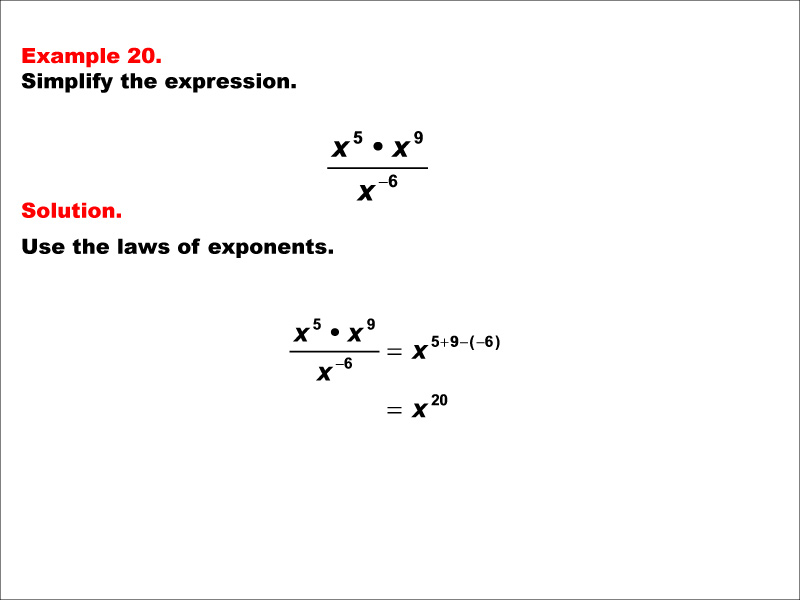
Display Title
Math Example--Exponential Concepts--Laws of Exponents: Example 20
Display Title
Math Example--Exponential Concepts--Laws of Exponents: Example 20

Topic
Exponents
Description
This example demonstrates the simplification of an expression involving multiplication and division with both positive and negative exponents. The problem involves simplifying (x5 * x9) / x-6, which results in x20. This showcases how positive and negative exponents interact when multiplying and dividing terms with the same base, and how dividing by a negative exponent can lead to a larger positive exponent.
Understanding how to handle expressions with mixed positive and negative exponents in both multiplication and division is crucial in algebra and higher mathematics. These examples help students grasp the concept that when multiplying terms with the same base, exponents are added, and when dividing, they are subtracted. However, when dividing by a negative exponent, it becomes addition. By presenting various scenarios, students learn to apply these rules confidently in different mathematical contexts.
Exposure to multiple worked-out examples is essential for students to fully comprehend the concept of combining multiplication and division with mixed exponents. Each example builds upon previous knowledge, reinforcing core principles while introducing new complexities. This approach helps students develop a deeper understanding and the ability to tackle more challenging problems involving exponents.
Teacher's Script: Let's look at an interesting example that combines multiplication and division with both positive and negative exponents: (x5 * x9) / x-6. First, let's multiply the terms in the numerator by adding their exponents: x5 * x9 = x14. Now, we divide this result by x-6. Remember, when we divide by a negative exponent, it becomes addition. So, x14 / x-6 = x(14 + 6) = x20. Notice how dividing by a negative exponent actually increased our overall exponent. This is a powerful concept when working with mixed positive and negative exponents in division!
For a complete collection of math examples related to Exponents click on this link: Math Examples: Laws of Exponents Collection.
| Common Core Standards | CCSS.MATH.CONTENT.8.EE.A.1, CCSS.MATH.CONTENT.HSA.SSE.B.3.C |
|---|---|
| Grade Range | 8 - 12 |
| Curriculum Nodes |
Algebra • Exponential and Logarithmic Functions • Laws of Exponents |
| Copyright Year | 2013 |
| Keywords | exponents, laws of exponents |